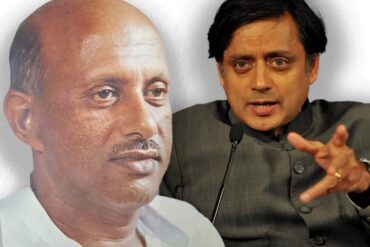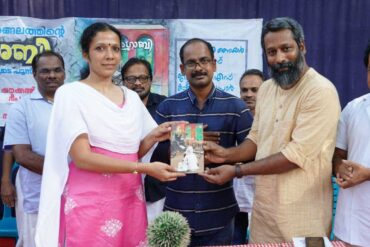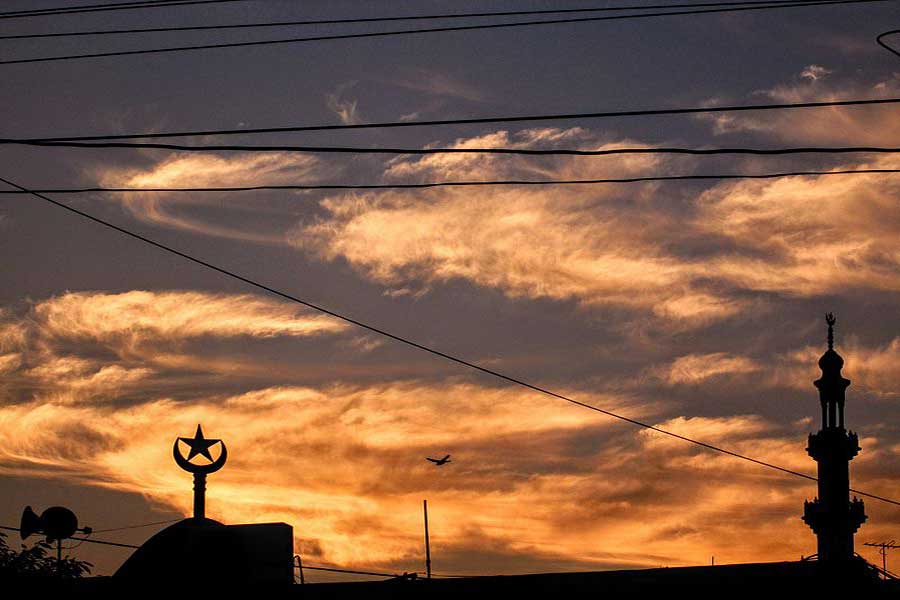During Mahatma Gandhi’s fast in Delhi in 1924, one of C F Andrews’ students, Ramachandran from Shantiniketan, came to clarify some doubts. When he asked Gandhi if he was against the use of machinery, he replied that he was against the craze of machinery and not against machinery as such. Gandhi further added that machines were stealing jobs from the poor, leading to an unequal distribution of wealth: “The craze is for what they call labor-saving machinery. Men go on ‘saving labor’ till thousands are without work and thrown on the open streets to die of starvation. I want to save time and labor, not for a fraction of mankind, but for all. I want the concentration of wealth, not in the hands of a few, but in the hands of all. Today machinery merely helps a few ride on the backs of millions.”
In the same conversation, Gandhi extolled the virtues of both Jesus and Prophet Muhammad because they strove after Truth, of whose necessary corollary were Beauty and Goodness. The truth that Gandhi was hinting at about the Prophet Muhammad must have been his life-long quest for equality and dignity of human beings, elaborated in Gandhi’s own abhorrence for the accumulation of wealth in a few hands. This was something that the Meccan merchants in Muhammad’s own time have been doing at the expense of the poorer clans.
In Young India in the same year, Gandhi wrote: “I became more than ever convinced that it was not the sword that won a place for Islam in those days in the scheme of life. It was the rigid simplicity, the utter self-effacement of the Prophet, the scrupulous regard for pledges, his intense devotion to his friends and followers, his intrepidity, his fearlessness, his absolute trust in God and in his own mission. These and not the sword carried everything before them and surmounted every obstacle.”
In his 1934 speech at Anjuman-e-Fidaye Islam, Gandhi reiterated what he had said almost a decade ago, “From my reading I received the impression that the Prophet was a seeker of Truth. He was god-fearing. In this I know I am not telling you anything new. I am only describing to you how I was impressed by his life.” In his autobiography, Gandhi confessed to have read Thomas Carlyle’s The Hero as a Prophet Mahomet: Islam, which praised Muhammad for his “sincerity of vision” (“He is a rough self-helping son of the wilderness; does not pretend to be what he is not.”) and frugality of life.
In most historical accounts, Islam has been described as imbued with radical egalitarian possibilities, taking on a supposed corrupt status quo. The Prophet becomes eminently relatable as a man on the periphery of society, born an orphan living on the goodwill and protection of his uncle, Abu Talib, making his way to respectability painstakingly. Partial acceptance comes when Khadijah, a wealthy widow, marries him because of his integrity and trustworthiness, a reputation he accumulated with years of hard work as a business agent for his uncle.
His eventual exile to Medina because of the hostility of the Meccans to his new faith, Islam, reduced him to an outsider once again at the age of fifty-three. As Lesley Hazleton writes in The First Muslim: The Story of Muhammad, “[Muhammad] had had to struggle for a sense of home in Mecca and, having gained it, had seen it wrenched away from him.”
The Prophet was not merely a spiritual leader but a political leader as well. In his quest to create a new community of believers, or to settle an old score with the Meccans who forced him to leave his birthplace in disgrace, he undertook multiple military expeditions against them as a means of resistance. Despite the philosophical divisions between deen (faith) and duniya (world), politics or worldliness has always been at the heart of Islam. As Karen Armstrong writes, Islam sacralises history with its intense focus on contemporary happenings.
Following the passing of the Prophet, some of the most crucial debates in the Caliphate centred on the spiritual worth of the ruler. While Caliphs such as Abu Bakr and Omar were held in high regard because of their simple living and spiritual worth, the later Umayyad and Abbasid rulers were often criticised by varying religious and esoteric movements for their deviance from the path of the Prophet and their indulgent life. From the very beginning of Islam, spiritual salvation was an essential ingredient for the creation of a just society, which required a divinely inspired political system as well.
It is within this imbricated context for a quest of spiritual as well as political supremacy, we must try to understand why the Prophet had exiled two of the Jewish tribes (Banu Qaynuqa and Banu Nadir) from Medina, while executing the male members of the third (Banu Qurayzah). Following the two successive Battles of Badr and Uhud, the Prophet felt that the three of the major Jewish tribes had violated the confederate agreement with the Aws and Khazraj tribes on whose request he had agreed to relocate to Medina as their arbitrator. The immediate reason for this conflict with the Jewish tribes was their reluctance to accept the Prophet as the final messenger of God in a long line of Prophets, as Armstrong writes, “…the Quran points out that Muhammad had not come to cancel the older religions, to contradict their prophets or to start a new faith. His message is the same as that of Abraham, Moses, David, Solomon, or Jesus.”
These powerful Jewish tribes in Medina saw Muhammad as a threat to their mercantile interest with the Meccans as well as a challenge to their power and, consequently, freely associated themselves with the Meccans during the wars between these two regions. This contingent use of a limited amount of force when required was a new form of jihad, added to the jihad of spirituality and intelligence, as Tariq Ramadan writes, “…al-qital, necessary armed resistance in the face of armed aggression, self-defence against oppressors.” Such use of force is rationalized as a check against the absolute power of a particular religion or group. However, seventeen other Jewish tribes continued living in Medina on friendly terms with Muslims, as a precursor to the concept of dhimmis or protected subjects during the Caliphate.
The worldly concern of achieving a just and equitable society has never been a distant concern for Muslims since their early days. However, the enmeshing of the spiritual and the political—Islam as a worldview–in the immediate context of seventh century Mecca and Medina has become distorted in contemporary times.
As Ziauddin Sardar writes in the aftermath of 9/11, Muslims have travelled away from the spirit of early Islam. “Far from being a liberating force, a kinetic social, cultural and intellectual dynamic for equality, justice and humane values, Islam seems to have acquired a pathological strain.” Consequently, contemporary Muslim politics has been reduced to a metaphysics.







